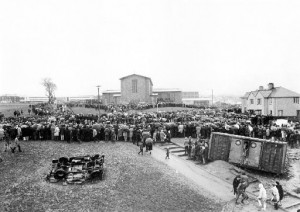La marcia per commemorare la Bloody Sunday che si svolgerà a fine mese sarà l’ultima, secondo quanto riferito dagli organizzatori

Gli eventi del giorno provocarono la morte di 14 persone, 13 in quel funesto giorno e un altra morì alcuni mesi più tardi. I soldati del 1° Battaglione Reggimento Paracadutisti aperto il fuoco contro una folla di manifestanti per i diritti civili.
Ora, una dichiarazione firmata dalla maggioranza delle famiglie delle vittime della Bloody Sunday dice che la marcia commemorativa non è più necessaria, dopo che il Rapporto Saville ha ampiamente scagionato i morti ed i feriti.
Nella dichiarazione, le famiglie riconoscono “un enorme debito di gratitudine” a coloro che li hanno sostenuti in questi anni.
Si ritiene che saranno in migliaia a prendere parte alla marcia finale del 30 gennaio. Un certo numero di opzioni vengono considerate per marcare i futuri anniversari, compreso un raduno presso il monumento della Bloodu Sunday, una messa di ricordo, un week-end per i diritti umani e una conferenza annuale sulla Bloody Sunday.
Il figlio di una delle vittime della Bloody Sunday ritiene sia giusto che la tradizione di una marcia commemorativa giunga al termine. Tony Doherty, il cui padre Patrick morì il 30 gennaio 1972, ha affermato: “La marcia è sempre stata utilizzata come strumento per la nostra campagna per la verità e la giustizia. E’ stata usata per mantenere viva la memoria dei morti e per mantenere agli occhi dell’opinione pubblica l’ingiustizia e la negazione della verità. Non ci aspettiamo e non possiamo aspettarci che la gente di Derry continui a fare la marcia per nostro conto quando la stragrande maggioranza di noi crede che la campagna si sia conclusa con successo”.
Tuttavia secondo Kate Nash, il cui fratello William fu ucciso quel giorno, la questione non era stata adeguatamente discussa.
“Non tutti siamo giunti ad una decisione. La sostanza di quello che viene detto su quello che dovrebbe accadere, non c’è niente di sbagliato in questo, perché che vi sarebbe comunque, ma perché eliminare la marcia?
“La marcia appartiene alla gente di questa città e sarebbe estremamente arrogante da parte della mia famiglia immaginare di poter prendere la decisione di porre fine ad una marcia che appartiene a questa città.
“Siamo convinti che la gente di Derry parlerà e ci farà sapere i loro desideri, quindi la famiglia rispetterà e aderirà ai loro desideri”.
Bloody Sunday march will ‘be the last’
THE Bloody Sunday march due take place at the end of this month will be the last one according to organisers.
The events of the day resulted in the deaths of 14 people, 13 on the day and another some months later-after soldiers from the 1st Battalion Parachute Regiment opened fire on civil rights protestors.
Now, a statement signed by the majority of the families of those killed on the day said it was no longer necessary after the Saville Report largely exonerated the dead and wounded.
In the statement, the families acknowledged a “huge debt of gratitude” to those who have supported them over the years.
Thousands are expected to take part in the final march on January 30. A number of options are now being considered to mark future anniversaries including gathering at the Bloody Sunday monument, remembrance Mass, a human rights weekend and an annual Bloody Sunday lecture.
The son of one of those killed on Bloody Sunday has said it is right that the tradition of a commemorative march come to an end. Tony Doherty, who father Patrick died on the day said: “The march has always been used as a tool for our campaign for truth and justice. It was used to keep the memory of the dead alive and to keep the injustice and the denial of truth in the public eye. We don’t expect and we can’t expect the people of Derry to keep marching on our behalf when the vast majority of us believe the campaign has been successfully concluded.”
However, Kate Nash, whose brother William also died on Bloody Sunday, said she felt the issue had not been properly discussed.
“We didn’t all come to any decision. The substance of what’s being said about what should happen, there’s nothing wrong with that because that would be there anyway, but why take the march away?
“That belongs to the people of this city and it would be extremely arrogant of my family to imagine we could make a decision to end a march that belongs to this city.
“We believe the people of Derry will speak and let their wishes be known on this and family will respect and abide by their wishes.”